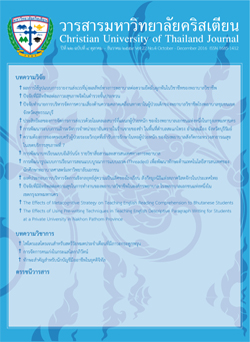ผลการใช้กลวิธีอภิปริชานในการสอนภาษาอังกฤษที่มีต่อการอ่านเพื่อความเข้าใจของนักเรียนชาวภูฏาน
บทคัดย่อ
งานวิจัยนี้ศึกษาผลของการสอนด้วยกลวิธี อภิปริชานที่มีต่อความสามารถในการอ่านเพื่อความเข้าใจของนักเรียนชาวภูฏานที่ใช้ภาษาอังกฤษเป็นภาษาที่สอง และความคิดเห็นต่อวิธีการสอนด้วยกลวิธิอภิปริชาน กลุ่มตัวอย่างเป็นนักเรียนที่กำลังศึกษาระดับเกรด 11 ในโรงเรียนมัธยมศึกษา เมืองทิมพู ประเทศภูฏาน จำนวน 81 คน กลุ่มตัวอย่างแบ่งออกเป็น 2 กลุ่ม คือ กลุ่มควบคุม จำนวน 43 คน ซึ่งได้รับการสอนด้วยวิธีแบบดั้งเดิม และกลุ่มทดลองจำนวน 38 คน ซึ่งได้รับการสอนด้วยกลวิธี อภิปริชาน โดยมีการเรียนการสอนจำนวน 12 ครั้งๆ ละ 2 ชั่วโมง ข้อมูลวิจัยเก็บรวบรวมได้จาก การทดสอบก่อนเรียน และหลัง เรียน รวมทั้งการสัมภาษณ์ ใช้สถิติ ANCOVA ในการวิเคราะห์คะแนนทดสอบก่อนเรียนและหลังเรียน จากการวิจัยพบว่า การสอนด้วยกลวิธีอภิปริชานในกลุ่มทดลองมีประสิทธิผลมากกว่าการสอนแบบวิธีดั้งเดิมในกลุ่มควบคุมอย่างมีนัยสำคัญ นอกจากนี้นักเรียนมีทัศนคติที่ดีต่อการสอนด้วยกลวิธี อภิปริชาน จากการค้นพบในการศึกษาวิจัยครั้งนี้ ผู้วิจัยให้ข้อเสนอแนะว่าควรใช้กลวิธีอภิปริชานในการสอนอ่านเพื่อความเข้าใจของนักเรียนชาวภูฏานในระดับเกรด 11
เอกสารอ้างอิง
Auerbach, A. & Paxton, D. (1997). "It's not the english thing : Bringing reading research into the ESL Classroom" . TESOL Quarterly. (31): 231-267.
Baker, L. (2005). Developmental differences in metacognition : Implications for metacognitively oriented reading instruction. In S. E. Israel, K. L. Bauserman, C. C. Block & K. Kinnucan-Welsch (Eds.) . Metacognition in literacy learning : Theory, assessment, instruction and professional development . Abingdon: Lawrence Erlbaum Associates.
Barnett, M. A. (1998). Teaching reading in a foreign language. ERIC Digest.
Betsis, A., & Mamas, L. (2013). Succeed in IELTS Academic 6 Practice Tests for the IELTS Academic Module. United Kingdom : GLOBAL ELT LTD.
Boulware-Gooden, R., Carreker, S., & Joshi, R. (2007). "Instruction of metacognitive strategies reading enhances reading comprehension and vocabulary achievement of third-grade students" . Reading Teacher. 61(1): 70-77.
Bucuvalas, A. (2002). Looking closely at second-language learning : An interview with shattuck Professor Catherine snow. HGSE news, 1 October. [Online]. Retrieved October 5, 2015 from https://www.gse.harvard.ed/news/features/snow10012002.html.
arrell, P. L. (1995). L2 reading strategy training : What is the role of metacognition? Paper presented at the 30 TESOL Annual Convention, Chicago, and 26-30 March.
CERD. (2002). The silken knot : Standard for english for schools in Bhutan. Paro: Department of Education.
Chamot, A. U. (2005). The cognitive academic language learning approach (CALLA) : An update. In P.A. Richard-Amato & M.A. Snow (Eds.), Academic Success for English Language Learners: Strategies for K-12 Mainstream Teachers. White Plains, NY: Longman.
Eilers, L. H., & Pinkley, C. (2006). "Metacognitive strategies help students to comprehend all text". Reading Improvement. 43(1): 13-29.
Eskey, D. (2005). Reading in a Second Language. In E. Hinkel (Ed.), Handbook of research on second language teaching and learning. Mahwah, NJ: Lawrence Erlbaum.
Flavell, J. H. (1976). Metacognitive aspects of problem solving. In L. B. Resnick (Ed.), The nature of intelligence. Hillsdale, NJ: Erlbaum.
Goldenberg, C. (2011). "Reading Instruction for English Language Learners". Handbook of Reading Research. (4): 684-710.
Goodman, K. S., & Goodman, Y. M. (2009). Helping Readers Make Sense of Print: Research that Support a Whole Language Pedagogy. In SE Israel & GG Duffy (Eds). Handbook of Research on Reading Comprehension. New York : Routledge.
G nes, F. (2007). T rkce gretimi ve zihinsel yap1land1rma. Ankara : Nobel.
Houtveen, A. M., & van de Grift, W. M. (2007). "Effect of Metacognitive Strategy Instruction and Instruction time on Reading Comprehension". School Effectiveness and School Improvement. 18(2): 173-190.
Korabiak, K., & Mete, N. (2004). ICT in the discipline of reading. [Online]. Retrieved October 5, 2015 From https://www.uoregon.edu/~moursund/DigitalAge1/Project-Reading.pdf.
LaPrairie, M. (2013). A case study of english-medium education in Bhutan. Unpublished Degree of Doctor Dessertation. Institute of Education: University of London.
Maasum, T. N. R. T.M., & Maarof, N. (2012). "Empowering ESL Readers with Metacognitive Reading Strategies". Procedia-Social and Behavioral Science. (69): 1250-1258.
McNamara, D. S. (2004). "SERT: Self-explanation reading training ". Discourse Processes. (38): 1-30.
Othman, Y., Mahamud, Z., & Jaidi, N. (2014). "The Effects of Metacognitive Strategy in Reading Expository Text " . International Educational Studies. 7(13): 102-111.
Pammu, A., Amir, Z., & Maasum, T. N. R. T. M. (2014). "Metacognitive Reading Strategies of Less Proficient Tertiary Learners : A Case Study of EFL Learners at a Public University in Makassar, Indonesia" . Procedia-Social and Behavioral Science. (118): 357-364.
Parris, S. R.,Gambrell, L. B. & Schlcicher, A. (2008). Beyond borders : A global perspective on reading comprehension. In C.C. Block & S. R. Parris (Eds). Comprehension instruction : Research-based best practices. (2 ed). New York : The Guilford Press.
Pressley, M., & Afflerbach, P. (1995). Verbal protocols of reading : The nature of constructively responsive reading. Hillsdale NJ: Erlbaum.
Shokrpour, N. & Fotovatian, S. (2009). "Effects of Conscious Raising of Metacognitive Strategies on EFL Pre-University Students' Reading Comprehension ". ITL-International Journal of Applied Linguistic. (157): 75-92.
Tavakoli, H. (2014). "The Effects of Metacognitive Strategy Awareness in Reading : The Case of Iranian University EFL Students ". The Reading Matrix. 14(2): 314-334.
Vygotsky, L. S. (1978). Mind in society : The development of higher psychological processes. Cambridge, MA: Havard University Press.
Vygotsky, L. S. (1986). Thought and language (A. Kozulin, Ed. & Trans.). Cambridge, MA : MIT Press.
Wenden, A. L. (2001). Metacognitive Knowledge in SLA: The Neglected Variable. In M. P. Breen (Ed.), Learner Contributions to Language Learning: New Directions in research (pp.44-46).
Williams, J. P. (2008). Explicit instruction can help primary students learn to comprehend expository text. In Block, C.C & Parris, S. R., (Eds). Comprehension instruction: research-based best practices. (2 ed.). New York : The Guilford Press.
Willcutt, J. R., & Palumbo, T., Samuels, S. J., Ediger, K.A.M., (2005). Role of automaticity in metacoginition and literacy instruction. In S. E. Israel, K. L. Bauserman, C. C. Block & K. Kinnucan-Welsch (Eds.), Metacognition in literacy learning: Theory, assement, instruction and professional development . Abingdon: Lawrence Erlbaum Associates.
Yahya, O. (2010). "Application of metacognition strategies and awareness when reading texts". The International Journal of Learning. 17(3): 145-153.
Yahya, O., Ghazali, M., Shamsudin, A., & Roselan, B. (2008). "Proses pemahaman daripada Perspektif Metakognitif Dalam Kalangan Pelajar Universiti". Pertanika Journal of Social Science dan Humanities. 16(2): 213-222.
Yahya, O., & Ghazali, M. (2012). "Comprehension process in metacognitive perspective among university student". International Journal for Educational Studies. 2(2): 171-183.
Zhang, L., & Seepho, S. (2013). "Metacognitive strategy use and academic reading achievement: Insights from a chinese context". Electronic Journal of Foreign Langusge Teaching. 10(1): 54-69.



